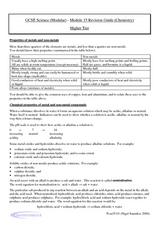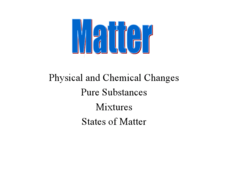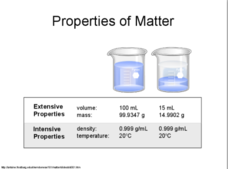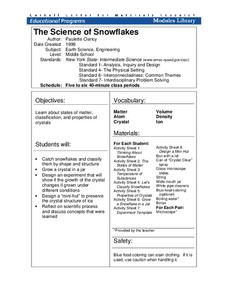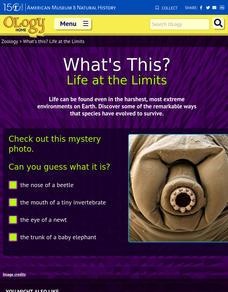Curated OER
Review Set
The topics covered in these multiple choice questions are about atomic structure and bonding, state configurations, pressure and solution concentration, and energy graphs. This is a midterm review which could be used with the whole...
Curated OER
Dry Ice: Simply Sublime
A fascinating lesson plan on states of matter is here for your young scientists. Dry ice is used to challenge learners preconceived notions about how solids work. They discover all sorts of interesting facts about states of matter from...
Curated OER
The Halogens
In this chemistry worksheet, students answer 24 questions related to properties of halogens. They fill in the table with the correct answers and participate in teacher demo.
Curated OER
Revision Guide - Chemistry
Don't you wish you had the time to type up a study guide for your chemistry class? With this resource, there is no need! A chart comparing the properties of metals and non-metals tops the handout, followed by notes on the reactivity...
Curated OER
Metals and Non-Metals
A table of the physical properties of metals and non-metals opens this high-school chemistry handout. Also covered are the chemical properties of metals and non-metals, reactivity, and fossil fuels. There are no specific questions to...
Curated OER
WS 1.2 Metric Units I/ Physical vs. Chemical
In this metric units and properties activity, students determine the proper metric unit given a variety of measurements for specific items. They also identify chemical and physical properties and chemical and physical changes.
Curated OER
Classification of Matter
This is a great worksheet with an infographic to assist your students in categorizing matter into mixtures and non-mixtures. Information is given about the metric system of measurement. Your young students match 13 terms with their...
Curated OER
Elements Commercials
Student teams use a digital camcorder and iMovie to create a commercial about an element. They also use the Internet and their textbook to gather the following information about their element: the name, the symbol, the atomic number, the...
Curated OER
Atomic Structure and Ionic Bonding (A Visual Approach)
Using toothpicks, marshmallows, and round colored sticky dots, physical science enthusiasts build models of an atomic nucleus. In this eighth grade chemistry lesson plan, they play an atom-naming game with the models that they have...
Curated OER
Covalent Bonding
Using chlorine as the model to demonstrate the structures and representations, this PowerPoint clearly labels and details the main atomic structures and reasons for bonding. The electrons in the outer shell are diagramed and then the...
Curated OER
Matter
In a neat and straightforward manner, this PowerPoint delivers basic introductory information on the properties of matter, physical and chemical changes, and pure substances vs. mixtures. It also defines the states of matter. For some...
Alabama Learning Exchange
Float or Sink?
Experiment with mass and density as scholars figure out what makes things float or sink. First, they watch a podcast introducing these concepts. Be sure to use the comprehension question to test their understanding. Young scientists...
NOAA
Ocean Layers I
How is it possible for ocean water to have layers? The sixth installment of a 23-part NOAA Enrichment in Marine sciences and Oceanography (NEMO) program investigates factors that cause different water densities to occur. Experiments...
NOAA
Ocean Layers II
Now that you know the ocean has layers, let's name them. The seventh installment of a 23-part NOAA Enrichment in Marine sciences and Oceanography (NEMO) program covers terminology associated with ocean layers, such as thermocline and...
Normal Community High School
Density
Change the density of water by adding minerals. The presentation discusses density—from the definition to calculations—and applies it to the real world. It briefly mentions specific gravity, and finishes by showing Archimedes'...
Science Geek
Phase Changes
Examine the energy transfer of phase changes through diagrams. The second slide show in a series of seven presents the information related to energy and phase changes. It includes the effect of pressure on phase changes.
Curated OER
Halogens
High schoolers identify the elements that belong to the halogen family on the periodic table. In this chemistry lesson plan, students describe the common characteristics of elements in this group. They research about hydrochloric acid's...
Curated OER
Transition Metals
Middle schoolers identify and describe transition metals. They discuss alloys and their benefits. Students research one common, alloy, its composition, properties, and uses. They are asked for some common properties of most transition...
Curated OER
Transition Metals (II)
High schoolers discuss transition metals, their properties, and where they are located on the periodic table as well as why transition metals are ideal for coins. After discussion, they conduct an experiment using copper in the form of...
Curated OER
More on Conduction and Convection
Why do some items feel colder when they are the same temperature? How should you keep your soda cold? What makes the wind blow? These are just some of the things middle schoolers discover when completing a lesson on...
Curated OER
Macromolecule Lab
During a macromolecule lab, young chemists perform multiple tests, including iodine starch tests, to determine if eight mystery foods contain lipids, sugars, or starches.
Cornell University
The Science of Snowflakes
Who can grow the best crystals? Challenge class members to develop strategies for enhancing growth in the crystals. Through a lab investigation, learners study the properties of crystals and test the effectiveness of different...
American Museum of Natural History
What's This? Life at the Limits
There are some amazing ways species evolve to survive. From large ears to sneezing salt, learners read about these interesting adaptations in an interactive lesson. Great to supplement an in-class lesson, it also works well as a remote...
Curated OER
WS 10.1 Organic Chemistry
In this organic chemistry worksheet, students compare inorganic and organic compounds. They write structural and molecular formulas for given molecules.





